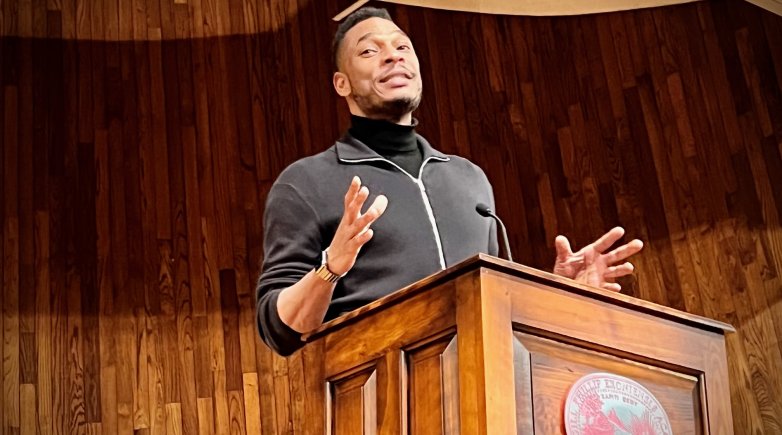Martín Espada speaks for the silenced
“I know of no poet that embodies the disembodied, enfranchises the disenfranchised, [and] epitomizes that promise of love and freedom more than Martín Espada,” Instructor in English Willie Perdomo said by way of introduction on Friday, as Exeter welcomed the celebrated poet to the Assembly Hall stage as part of the community’s celebration of Latinx Heritage Month.
Over the next half-hour, Espada’s sonorous voice rose and fell, at times quavering with emotion or approaching musical incantation, as he read four poems from his most recent book, Floaters. Named for the derogatory term used by some U.S. Border Patrol agents to describe migrants who drown trying to cross the Río Grande from Mexico to the United States, the collection won the 2021 National Book Award for Poetry.
“This poem started with a photograph,” Espada said of the title poem in his book, referring to an image of the drowned bodies of a Salvadoran father and his young daughter in the Río Grande that went viral in the summer of 2019. He wrote “Floaters” in response to the photograph, as well as to questions that emerged in a particular Border Patrol Facebook group about its veracity.
For another poem, “Jumping Off the Mystic Tobin Bridge,” Espada drew on his experience working as a tenant lawyer in the Boston area some 30 years ago, when he represented many low-income Spanish-speaking immigrants who faced eviction or exploitation by landlords. In the poem, he recalls his own experience with racism, as a taxi driver warns him about the many “Josés” in the neighborhood where he worked:
“He could hear the sawing of my breath as I leaned into his ear, past the bulletproof
barricade somehow missing, and said: I’m a José. I could see the 40-watt
squint in his rearview mirror. I’m Puerto Rican, I said. It was exactly
5 PM, and we were stuck in traffic on the Mystic Tobin Bridge.”
Espada rounded out the Assembly reading with two even more personal selections: a tender poem inspired by his wife — “I firmly believe that times of hate call for poems of love,” he said — and a poignant yet searing missive responding to the devastation of his late father’s native town, along with much of Puerto Rico, by Hurricane Maria in 2017. He closed by thanking the appreciative crowd, many of whom rose to their feet to applaud.
More to explore

Exeter Today

